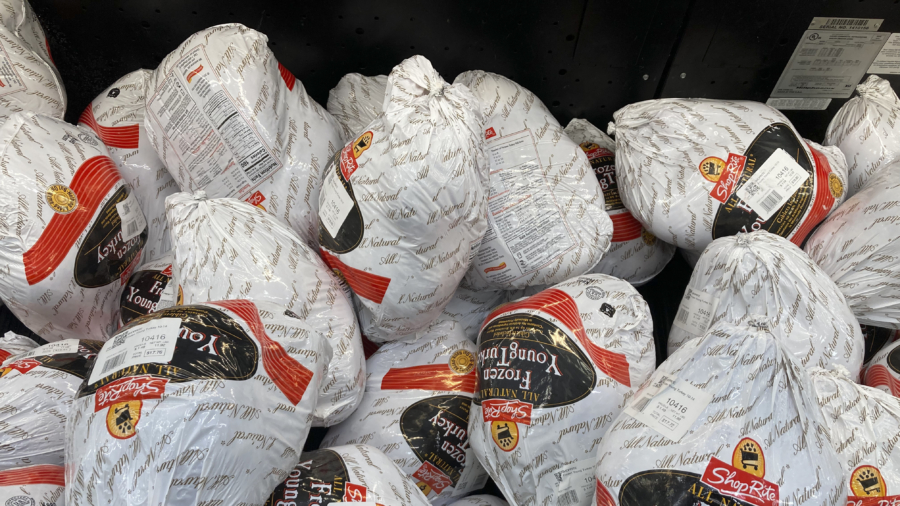Families can expect to pay 20 percent more to host a Thanksgiving dinner this year as food inflation continues to climb, the American Farm Bureau Federation (AFBF) stated in a new report.
According to the group’s 37th annual survey, the average cost of a Thanksgiving feast for 10 will be $64.05, or about $6.50 per person. This is up 20 percent, or $10.74, from last year.
The price for a 16-pound turkey surged 21 percent year-over-year to $28.96, driven by a wide range of factors, including the bird flu, diesel prices, labor shortages, and the cost of animal feed.
Farm bureau data show that the typical items gracing dinner tables everywhere or used to cook and bake have risen considerably. A four-pound ham, for example, has climbed by more than 7 percent to $11.64. A pumpkin pie mix has jumped by 17.51 percent to $4.28. A gallon of whole milk has increased by 16 percent to $3.84. Fourteen ounces of cubed stuffing spiked by nearly 70 percent to $3.88. Five pounds of russet potatoes have also surged by 23 percent to $3.64.
For the cranberry lovers in your family, however, the price of a 12-ounce bag of fresh cranberries tumbled by 14 percent to $2.57.
“General inflation slashing the purchasing power of consumers is a significant factor contributing to the increase in average cost of this year’s Thanksgiving dinner,” Roger Cryan, chief economist of the AFBF, said in a statement. “Other contributing factors to the increased cost for the meal include supply-chain disruptions and the war in Ukraine. The higher retail turkey cost at the grocery store can also be attributed to a slightly smaller flock this year, increased feed costs, and lighter processing weights.”
The U.S. annual inflation rate eased to 7.7 percent in October, but the food index advanced to 10.9 percent year-over-year. Supermarket prices also climbed by 12.4 percent.
Most food items listed in the Bureau of Labor Statistics’ Consumer Price Index have increased at exceptional rates over the past year, such as bread (14.8 percent), chicken (14.5 percent), eggs (43 percent), lettuce (17.7 percent), oranges (10.8 percent), and coffee (14.8 percent).
Cryan noted that whole turkeys should be available to consumers this year. However, he warned that there might be temporary shortages in some parts of the country where bird flu has been detected over the past 12 months.
Earlier this month, Secretary of Agriculture Tom Vilsack told reporters that trying to purchase 20-pound turkeys at supermarkets might be challenging this year because “some of the turkeys that are being raised right now for Thanksgiving may not have the full amount of time to get to 20 pounds.” He noted that households might need to settle with smaller birds because they’re more likely to be in stock.
Bird Flu and Diesel Prices
The highly pathogenic avian influenza (HPAI) virus has decimated poultry farmers in 2022 as the illness has been ubiquitous throughout the year. Typically, the bird flu has been around during the colder months, but commercial turkey producers discovered the disease in July, which is a critical time because this is when they begin raising flocks for both Thanksgiving and Christmas.
The unprecedented bird flu outbreaks aren’t only concentrated in the United States. They’ve been found worldwide, including in Canada, Europe, and Asia. Researchers warn that the virus is spreading in wild birds, making it harder to contain.
“All of us are feeling the pain of higher prices at the grocery store,” AFBF President Zippy Duvall said in a statement. “HPAI outbreaks in the spring and an uptick in cases in the fall are taking a toll, but farmers remain dedicated to ensuring America’s food supply remains strong.”
On top of the bird flu, farmers are also contending with soaring diesel costs.
According to the American Automobile Association, the national average for a gallon of diesel is up by 47 percent from last year to $5.35. But some jurisdictions are dealing with higher prices than the national average, such as California ($6.25), Pennsylvania ($6.17), New York ($6), and Massachusetts ($5.95).
The current upward trend in diesel prices has been caused by seasonal demand, lower domestic production capacity, and the prohibition on U.S. imports of Russian petroleum. Since 2019, U.S. diesel output capacity has tumbled by 180,000 barrels per day, while several plants have shuttered in recent years.
Overall, the growing cost of diesel has weighed on farmers and the nation’s food supply, Duvall says.
“Our nation’s food supply is driven by diesel,” Duvall wrote in a letter to President Joe Biden earlier this month. “Every input that arrives on our farms and ranches is transported by a diesel engine, whether that is by boat or barge, rail or truck. Our crops are planted by diesel engines and harvested by diesel engines. High diesel prices are severely impacting our farmers and ranchers, causing increased costs to consumers, and adding to food insecurity.”
Consumers Are Adapting
With households tightening their belts amid an elevated cost of living, shoppers are finding alternatives to expensive Thanksgiving dinners or costly turkeys.
A survey conducted by OnePoll on behalf of the nonprofit Farm Forward found that 64 percent of Americans might choose to gobble up plant-based dishes or serve less meat this Thanksgiving.
According to a poll from Personal Capital, 33 percent plan to substitute the turkey centerpiece with pizza. But a quarter of Americans revealed they would pass on Thanksgiving this year to save money. Others are bargain hunting, using coupons, skipping traveling, and comparing prices.
From The Epoch Times

